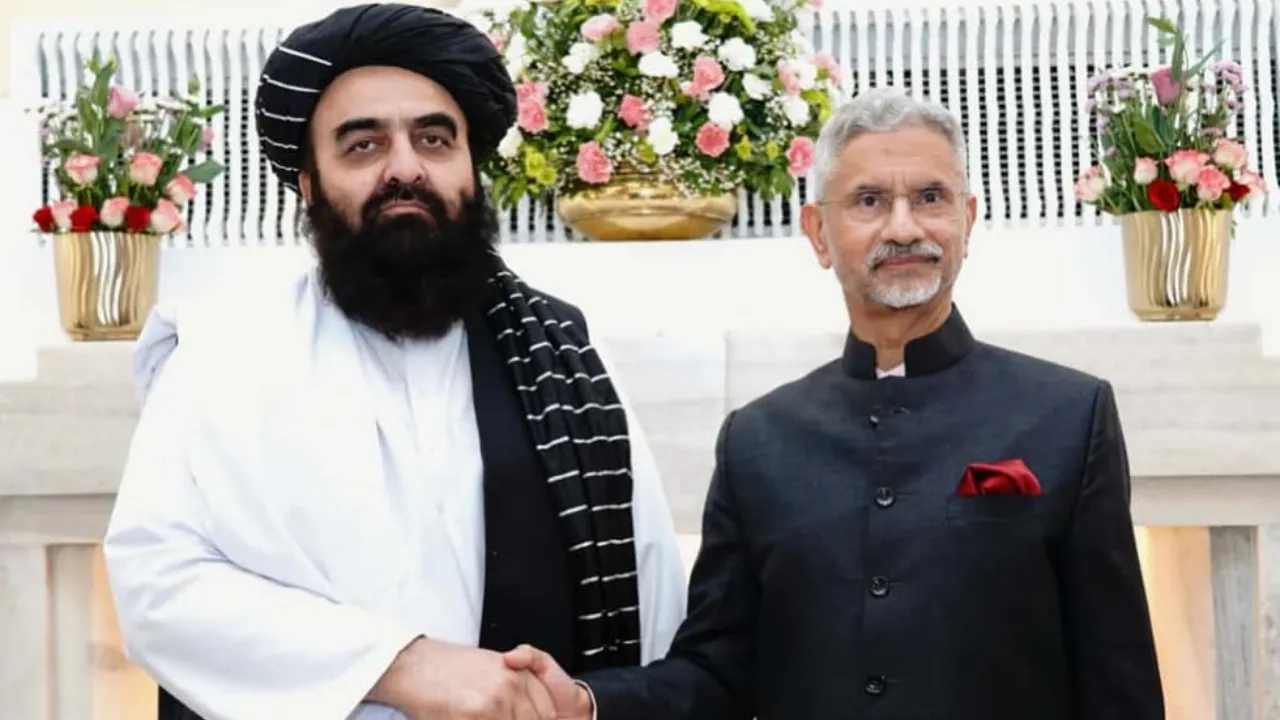Pak expresses ‘strong reservations’ over J&K reference in India–Afghan joint statement
Pakistan has officially expressed “strong reservations” over a reference to Jammu and Kashmir in the joint statement issued after the recent meeting between India and Afghanistan in New Delhi. The issue arose during Afghan Foreign Minister Amir Khan Muttaqi’s high-profile visit to India, which marked a new chapter in engagement between New Delhi and Kabul under the Taliban-led government. The controversy quickly triggered a diplomatic protest from Islamabad, calling the mention of Jammu and Kashmir a “clear violation” of United Nations Security Council resolutions.
According to Pakistan’s Foreign Office, the reference in the joint statement “goes against the relevant UN resolutions and undermines the international consensus” on the Kashmir dispute. The statement added that Pakistan summoned the Afghan ambassador in Islamabad to convey its strong objections and seek an explanation. The reaction came within hours of the India–Afghanistan joint statement, which contained subtle references treating Jammu and Kashmir as part of India’s internal affairs—a sensitive subject for Pakistan.
Amir Khan Muttaqi’s visit to India: Why it matters
Amir Khan Muttaqi, during his India visit, met External Affairs Minister S. Jaishankar to discuss bilateral cooperation, humanitarian assistance, regional security, and counter-terrorism. The joint statement highlighted both sides’ commitment to combating terrorism and mentioned mutual respect for sovereignty and territorial integrity. It also referred to recent attacks in Jammu and Kashmir, a move Pakistan viewed as legitimizing India’s position on the region. Islamabad called the reference a deliberate attempt to “endorse India’s illegal occupation of Jammu and Kashmir,” urging Kabul to avoid aligning itself with what Pakistan calls India’s “unilateral” position on the issue.
The Pakistani Foreign Office further stated that any mention of Jammu and Kashmir in international statements that treat it as an integral part of India constitutes a violation of international law and UN resolutions.
Pakistan’s strong response and diplomatic protest
Pakistan’s Foreign Office summoned Afghanistan’s envoy in Islamabad to formally register its protest. Officials emphasized that Afghanistan should remain “neutral” in disputes involving India and Pakistan and should not become a party to what they described as “India’s narrative on Kashmir.” Islamabad also reminded Kabul of its past support for the Kashmiri people’s right to self-determination.
Pakistan’s objection was not limited to the Kashmir reference alone. Officials also criticized Amir Khan Muttaqi’s comments during his India visit, where he reportedly suggested that terrorism was Pakistan’s “internal problem.” Pakistan responded sharply, accusing the Afghan side of ignoring the presence of anti-Pakistan militant groups operating from Afghan soil. This marks another flashpoint in already tense relations between Islamabad and Kabul, which have been strained due to repeated border clashes and allegations of cross-border terrorism.
India’s perspective on the meeting with Amir Khan Muttaqi
India, on the other hand, has used its dialogue with Amir Khan Muttaqi to emphasize the need for a stable and inclusive Afghanistan. New Delhi reiterated its commitment to the Afghan people through developmental assistance, education, and humanitarian support. India views its engagement with Kabul as a strategic necessity, especially as China and Pakistan seek deeper influence in the region.
Analysts believe that Amir Khan Muttaqi’s outreach to India was aimed at balancing Afghanistan’s regional relationships, signaling that Kabul does not wish to rely solely on Pakistan or China for diplomatic and economic cooperation. The visit was also a chance for Afghanistan to gain international legitimacy by engaging with major regional powers like India.
Why Islamabad feels threatened by India–Afghan ties
For Islamabad, the growing warmth between New Delhi and Kabul is a worrying sign. Pakistan has historically viewed Afghanistan as within its strategic sphere of influence, but India’s re-engagement with the Taliban-led government could shift that balance. Pakistan’s immediate protest reflects this unease and its desire to remind Kabul that the Kashmir issue remains a red line in South Asian diplomacy.
Experts point out that Pakistan’s diplomatic protest serves multiple purposes: it signals disapproval to Kabul, reassures domestic audiences, and reinforces Islamabad’s claim that Jammu and Kashmir remains a disputed territory.
Regional impact and what happens next
So far, the dispute remains limited to diplomatic channels, with Pakistan summoning the Afghan envoy and issuing strong public statements. No major retaliatory measures have been announced, but tensions remain high given ongoing border skirmishes between Pakistan and Afghanistan in recent weeks.
Observers believe that both countries will seek to de-escalate through quiet diplomacy. Afghanistan, under Amir Khan Muttaqi, is unlikely to risk alienating Pakistan completely, given its dependence on trade routes and energy supplies through Pakistani territory. However, Kabul may also continue to engage with India for economic and political reasons.
What this means for South Asia
This episode highlights the delicate balance of power in South Asia. A single phrase in a joint statement can carry deep political implications. The reference to Jammu and Kashmir was enough to spark a diplomatic flare-up between two neighboring countries already dealing with border tensions and security concerns.
For India, the meeting with Amir Khan Muttaqi was an opportunity to reassert its relevance in Afghanistan and strengthen regional partnerships. For Afghanistan, it represented a step toward greater diplomatic acceptance. For Pakistan, it served as a reminder that its influence in Kabul may no longer be as dominant as before.
Conclusion
The controversy over the Jammu and Kashmir reference in the India–Afghanistan joint statement underscores how historical disputes continue to influence modern diplomacy in South Asia. Amir Khan Muttaqi’s visit to India was intended to focus on cooperation and development, yet the fallout revealed how fragile regional relations remain.
Whether Islamabad and Kabul can manage this dispute through dialogue will determine how stable their future interactions are. For now, the episode reinforces one reality: in South Asian politics, even a single word about Jammu and Kashmir can reshape diplomatic narratives overnight.
Also Read: Aditi Rao Hydari Slays Fashion Ramp After Film Fame!




































